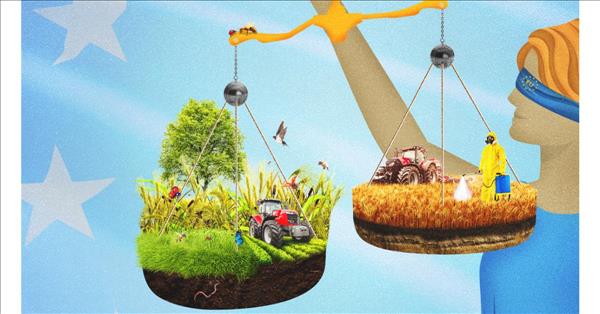(MENAFN- EIN Presswire) Weighing pesticide use vs. sustainable agriculture
In a new report, EASAC expresses concern about Member States and industry using loopholes in EU pesticide law to allow the continued use of neonicotinoids
To claim that the threat to food security due to Russia's invasion of Ukraine means we have to stick with conventional chemical-dependent agriculture is unjustified.” - Prof. Michael Norton, Director EASAC Environment ProgrammeBERLIN, GERMANY, March 2, 2023 /einpresswire.com / -- Prof. Michael Norton, EASAC's Environment Director:“To claim that the threat to food security due to Russia's invasion of Ukraine means we have to stick with conventional chemical-dependent agriculture is unjustified. There is plenty of evidence that proposed alternative methods can deliver the same or even better yields while maintaining nature's ecosystem services.”
EASAC's review of the latest science confirms that the EU got it right when it banned the main three neonicotinoids (neonics) five years ago. This class of insecticides has indiscriminate effects on pollinators and other beneficial insects as much as on the targeted pests, thereby posing a serious threat to biodiversity and longer-term food security.
But while commending the EU lead, the scientists caution against the persistence of loopholes that undermine the initial regulatory action. The first loophole is that using emergency authorisations to continue the use of banned neonics has become a habit for some countries.“As the European Court of Justice recently ruled, over-use of this practice should stop,” explains Norton.
“A similar problem to that we are seeing with antibiotics”
The second loophole is the ever-faster race to find new toxins. The restrictions on the original neonics created incentives to develop substitutes that exploit the same insect neural mechanisms. EASAC's analysis identifies a long pipeline of potential future chemicals which tests the limits of the regulatory approval system and could allow for the production and use of equally damaging substitutions.
According to studies, seven out of ten honey samples contain traces of at least one of the bee-toxic pesticides.“It is often not recognized how much of a poisonous landscape some farms have become over the last two decades, with the toxic load for all insects having risen by orders of magnitude,” says Professor Lars Walløe, Co-Chair of EASAC's Environment Steering Panel.“We still see increased contamination of soils, water courses, and even estuaries and coastal seas.”
“The industry has engaged in a lose-lose race. It is counterproductive to kill everything, since once the pest adapts to the pesticide, there may be no natural enemies remaining, let alone essential pollinators. It is a similar problem to that we are seeing with the wide use of antibiotics,” comments Professor Edward Mitchell of the University of Neuchatel, Switzerland.
Prioritize Integrated Pest Management
The EASAC report fully supports the European Commission's efforts to make Integrated Pest Management (IPM) the primary route to sustainable agriculture. IPM relies on a set of common-sense practices, using comprehensive information on the life cycles of pests and their interaction with the environment. Low-risk pesticides can be based on bacteria, fungi, or substances such as limestone or pepper, for example.“Simply resorting to synthetic pesticides is old-fashioned thinking. Sometimes, just a swarm of ladybirds would do a much better job”, explains Norton. However, IPM does require strong support for farmers to adapt and the report identifies steps to be taken for IPM to be welcomed by farmers as their preferred approach.
The report summarises the results of research in recent years and strengthens earlier conclusions in easac's 2015 review on the wider ecosystem effects of neonicotinoids. They support measures to minimize future use beyond existing restrictions, including revisiting the environmental risk assessment (ERA) in the approval processes.
Reinforce regulations and testing processes
“This policy debate is vitally important. Even with the EU's target of reducing the toxic load by 50 percent, we still have a long way to go before we approach genuinely sustainable agriculture. But without reinforcing regulations and testing processes, we will not even get close to it,” concludes Cláudia de Lima e Silva, Researcher at Wageningen University and Research.“We encourage industry to focus on the opportunities for supporting IPM and move away from mass sales in conventional agriculture.”
Full Report: Sabine Froning
European Academies Science Advisory Council - EASAC
+49 1520 8727000
Visit us on social media:
twitter
linkedin
youtube
MENAFN02032023003118003196ID1105694052
Legal Disclaimer:
MENAFN provides the
information “as is” without warranty of any kind. We do not accept
any responsibility or liability for the accuracy, content, images,
videos, licenses, completeness, legality, or reliability of the information
contained in this article. If you have any complaints or copyright
issues related to this article, kindly contact the provider above.























Comments
No comment